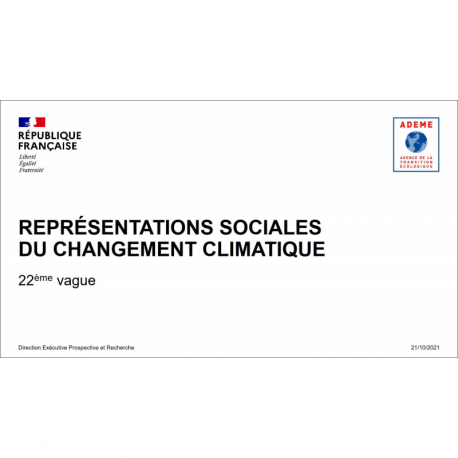ADEME Baromètre annuel: les Français et l’environnement

Source: ADEME
À quelques jours de la COP 26, l’ADEME dévoile les résultats de son baromètre annuel « Représentations sociales du changement climatique » mené auprès de 2700 personnes.
64% des Français accepteraient des changements importants dans leurs modes de vie à condition qu’ils s’appliquent de façon juste entre tous les membres de la société !
Le baromètre montre que les pratiques individuelles en faveur de l’environnement augmentent et s’accélèrent cette année :
🔸 70% des Français annoncent baisser la température de leur logement de 2 ou 3°C l’hiver ou limiter la climatisation à 26°C l’été 🌡
🔸 53% affirment limiter leur consommation de viande 🥕
🔸 27% des Français déclarent déjà boycotter des produits ou entreprises pour lutter contre le changement climatique 👊
🟢 Des chiffres qui témoignent d’une prise de conscience significative au sein de la population française qui s’empare des enjeux de la transition écologique.

Télécharger les fichiers complets: https://librairie.ademe.fr/changement-climatique-et-energie/4998-representations-sociales-du-changement-climatique-22-eme-vague-du-barometre.html
CHANGEMENT CLIMATIQUE : LES FRANÇAIS DE PLUS EN PLUS ENGAGÉS ET FAVORABLES À DES MESURES FORTES DE POLITIQUE PUBLIQUE
A quelques jours de la COP 26, l’ADEME dévoile les résultats de son baromètre annuel « Représentations sociales du changement climatique ». Comme chaque année depuis 2000, l’ADEME réalise cette enquête sous la forme d’un sondage administré à un échantillon représentatif de la population française. Pour la 22e édition, l’enquête a été réalisée auprès d’un échantillon de 1560 personnes âgées de 15 ans et plus et d’un sur-échantillon de 1139 personnes âgées de 55 ans et plus. Malgré le contexte de crise actuel, la transition écologique demeure la 2e préoccupation des Français, conscients de la nécessaire adaptation des territoires et enclins à rendre leur quotidien plus responsable.
Les enjeux de la transition écologique dans les principales préoccupations des Français
L’environnement reste encore cette année parmi les principales préoccupations des Français, derrière la santé publique, et à un niveau similaire aux enjeux d’emploi, de sécurité et d’immigration.
Pour faire face au changement climatique, 64% des Français accepteraient des changements importants dans leurs modes de vie à condition qu’ils s’appliquent de façon juste entre tous les membres de la société. Par ailleurs, les pratiques individuelles en faveur de l’environnement augmentent et s’accélèrent cette année concernant notamment les pratiques de consommation et d’économie d’énergie dans le logement. Nous constatons en effet que 58% des Français déclarent « consommer moins » ce qui représente 10 points de plus par rapport à 2020, 70% annoncent baisser la température de leur logement de 2 ou 3°C l’hiver ou limiter la climatisation à 26°C l’été (+9pts) et 53% affirment limiter leur consommation de viande (+7pts).
La mobilisation individuelle s’observe également par l’engagement citoyen : 27% des Français déclarent déjà boycotter des produits ou entreprises pour lutter contre le changement climatique (et 50% pourraient le faire). Ils s’engagent aussi davantage dans les associations de défense de l’environnement (10%) et pour certains, déclarent avoir déjà participé à une action de désobeissance civile (8%).
Les Français favorables à des mesures de politiques publiques fortes
L’Etat est attendu comme un acteur important pour limiter le changement climatique. A titre d’exemple, les Français maintiennent leur préférence en faveur d’une politique économique qui réoriente en profondeur de l’économie en soutenant exclusivement les activités qui préservent l’environnement, la santé et la cohésion sociale (60%, +3pts) plutôt que de relancer l’économie par tous les moyens afin de renouer au plus vite avec l’activité (40%). Parmi les mesures destinées à lutter contre le réchauffement climatique, « l’augmentation de la taxe carbone » obtient 51% d’avis favorable. Et lorsqu’une condition sociale (« que cela ne pénalise pas le pouvoir d’achat des ménages des classes moyennes et modestes ») et une affectation claire (« que les recettes de la taxe soient utilisées pour financer des mesures de transition écologique, notamment sur les territoires ») sont proposées, le pourcentage de personnes « favorables » est nettement plus élevé : 72%.
Mais dans un contexte où 80% des Français estiment que leur territoire sera dans l’obligation de prendre des mesures dans les décennies à venir pour s’adapter aux nouvelles conditions climatiques, ce sont les acteurs locaux, comme les associations et les collectivités locales, qui sont considérés comme les plus actifs au quotidien.
Les seniors, les retraités et le changement climatiqueContrairement aux jeunes générations, les séniors sont plus sceptiques quant à la réalité du changement climatique et en particulier de sa nature anthropique. Cependant, ils restent conscients de la gravité du problème. A titre d’exemple, 83% d’entre eux considèrent le changement climatique comme un problème très ou assez grave pour les générations futures.Le passage à la retraite provoque de timides inflexions, toutefois vertueuses, principalement dans la consommation alimentaire. On note cependant que les femmes retraitées semblent plus changer leurs pratiques que les hommes : 66% contre 50% des hommes achètent moins de plats préparés, 60% consomment moins de viande, contre 39% des hommes, 51% utilisent moins la voiture contre 35% des hommes, 53% achètent moins de vêtements neufs, contre 26% des hommes.Les retraités se montrent très attachés à la voiture : une très large majorité n’envisagent pas d’y renoncer (72%).On constate également qu’ils envisagent davantage de rénover et/ou adapter leur logement pour y rester le plus longtemps possible plutôt que de déménager.

